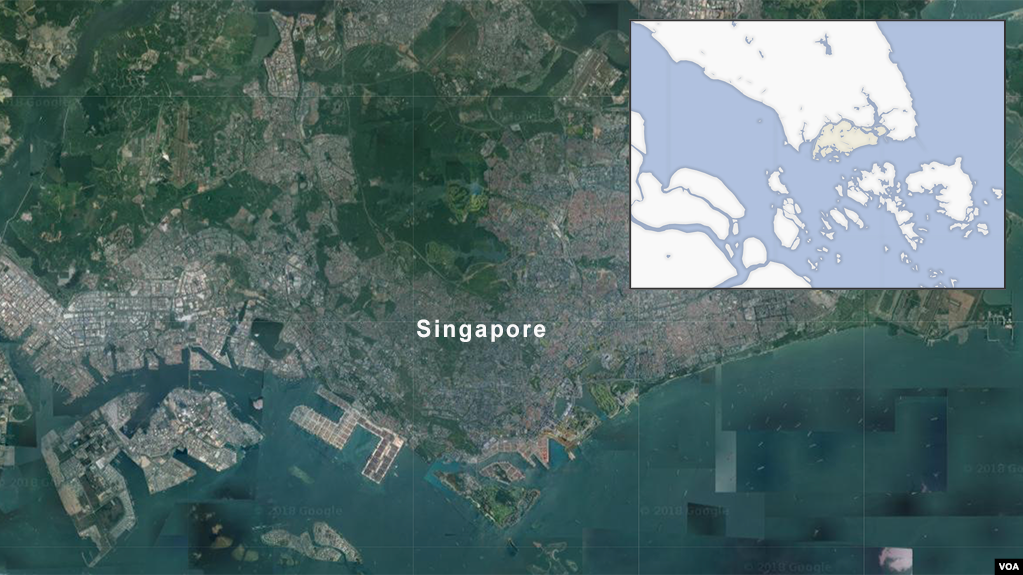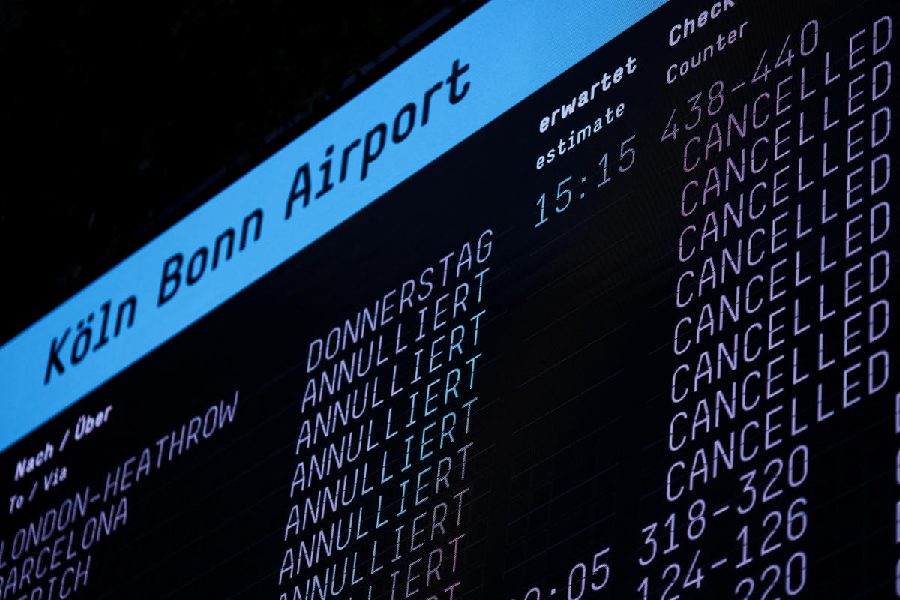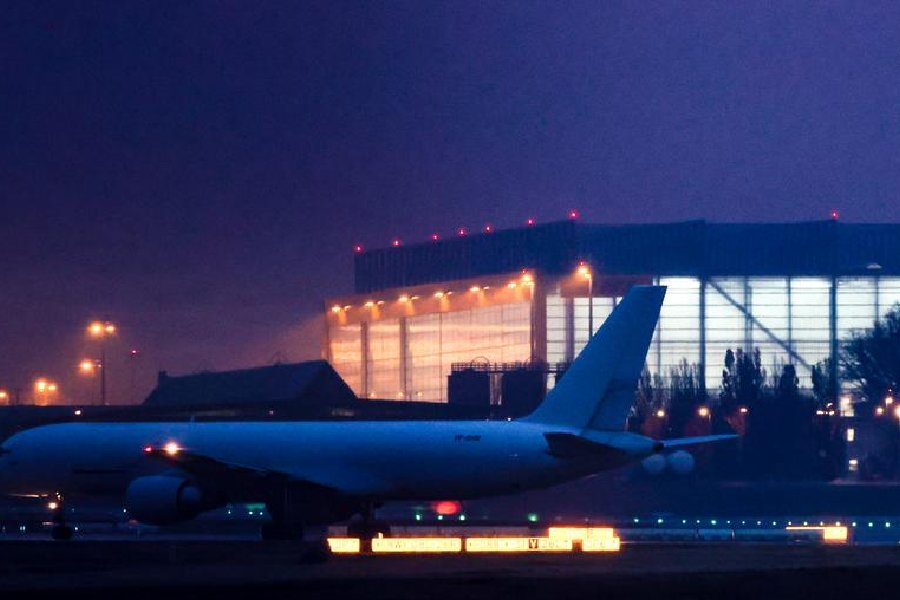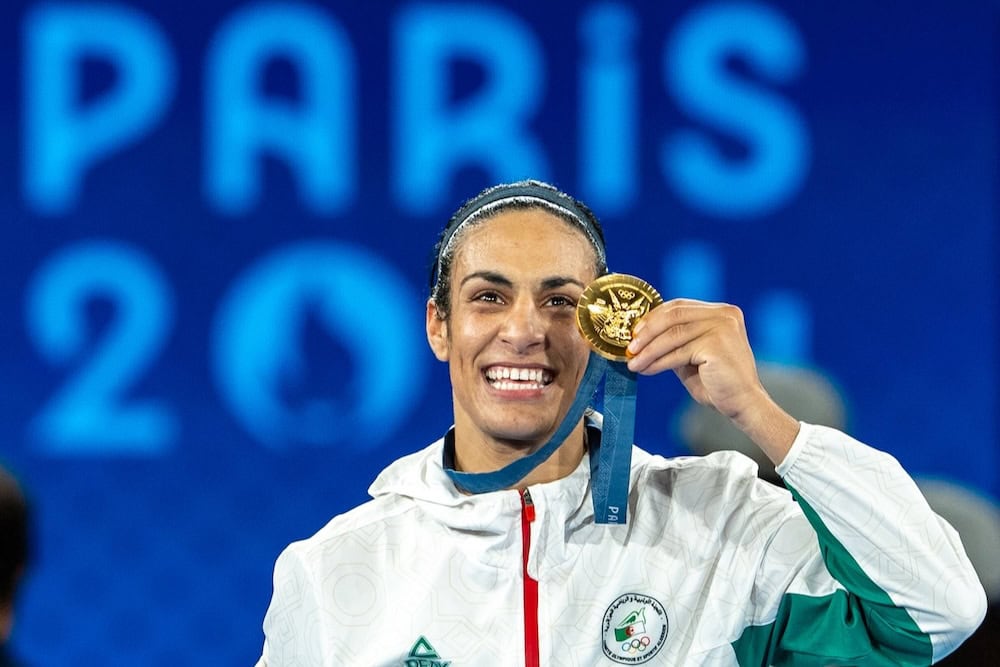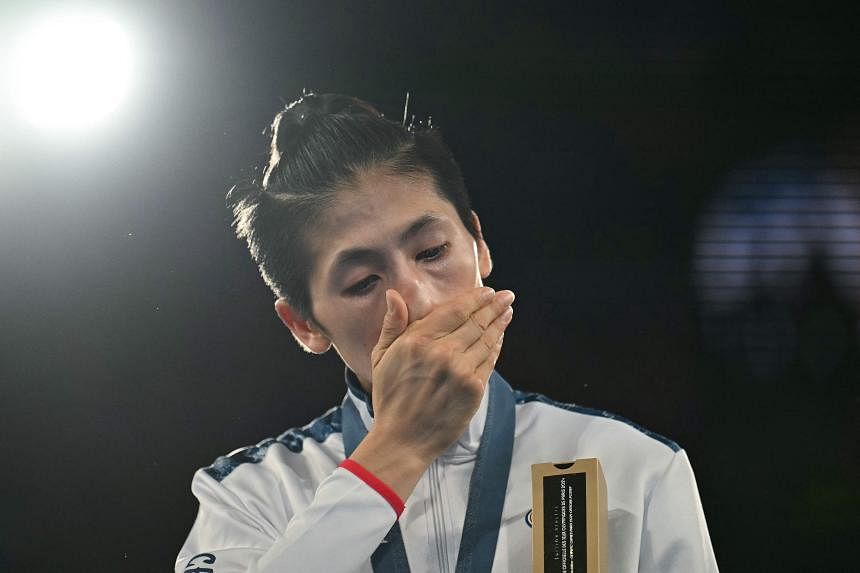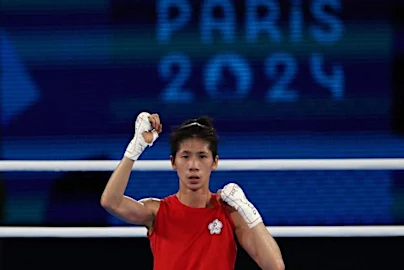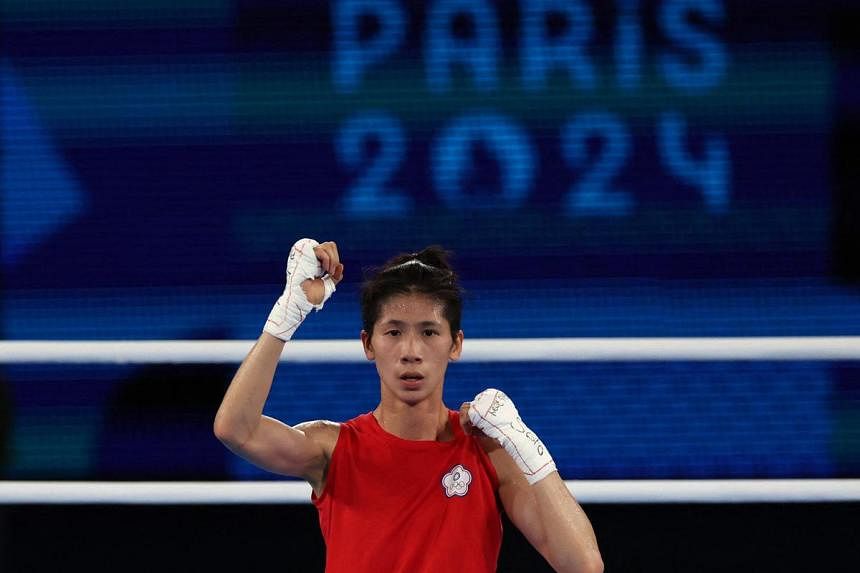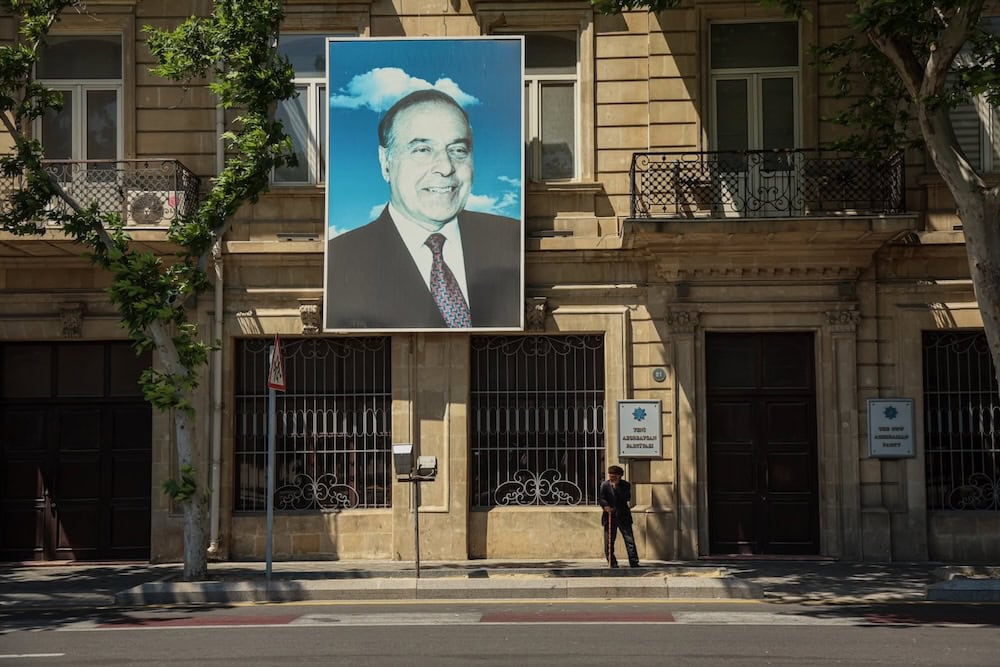‘We Are All on the Front Line’: DR Congo’s Young Women Rebels Take on M23
Country:
CONGO (DRC)
AUGUST 14, 2024
Author:
Sophie Neiman
GRANTEE
Pulitzer Center
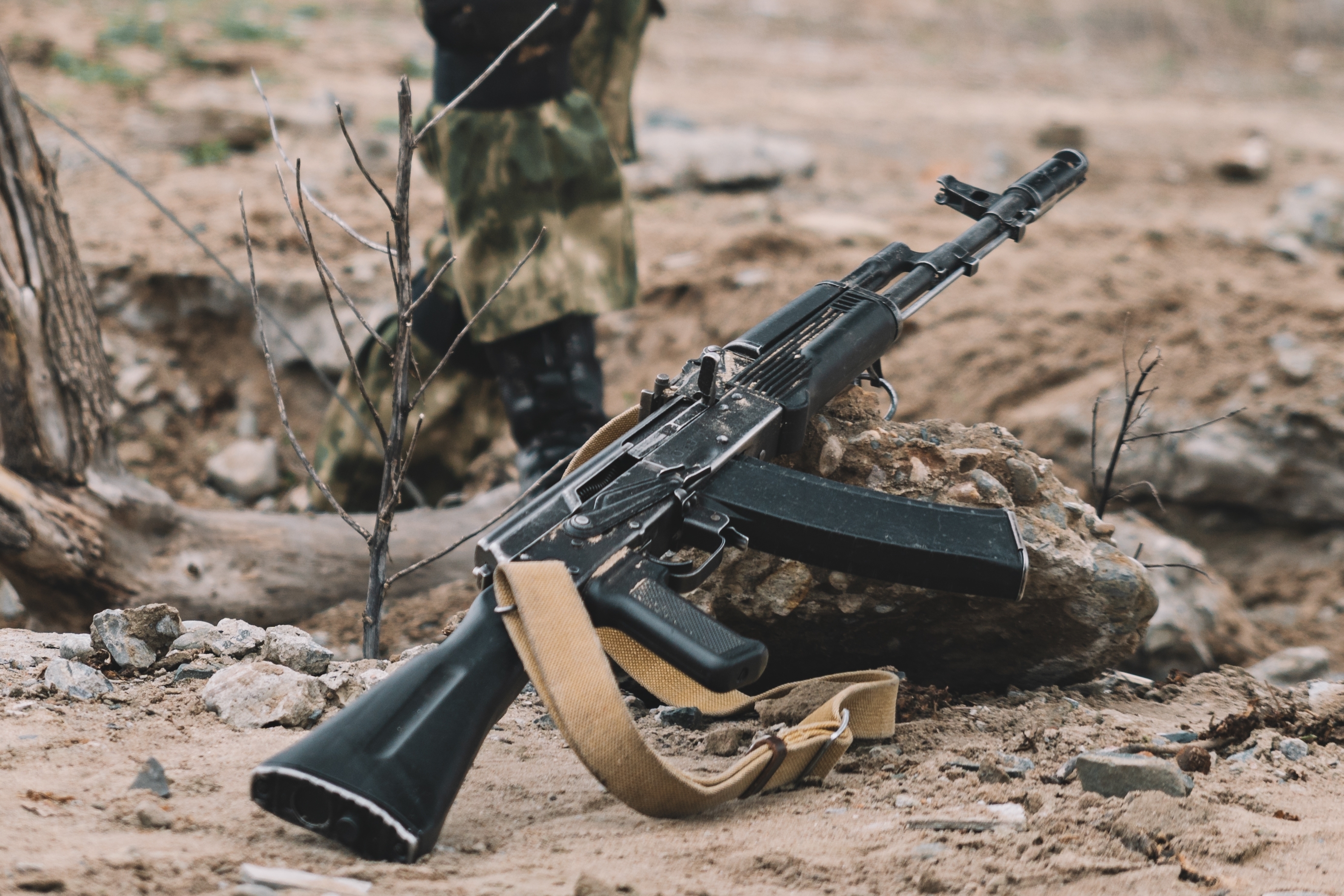
ENGLISH
Project
Women and War in Eastern Congo
READ MORE ABOUT THIS PROJECT
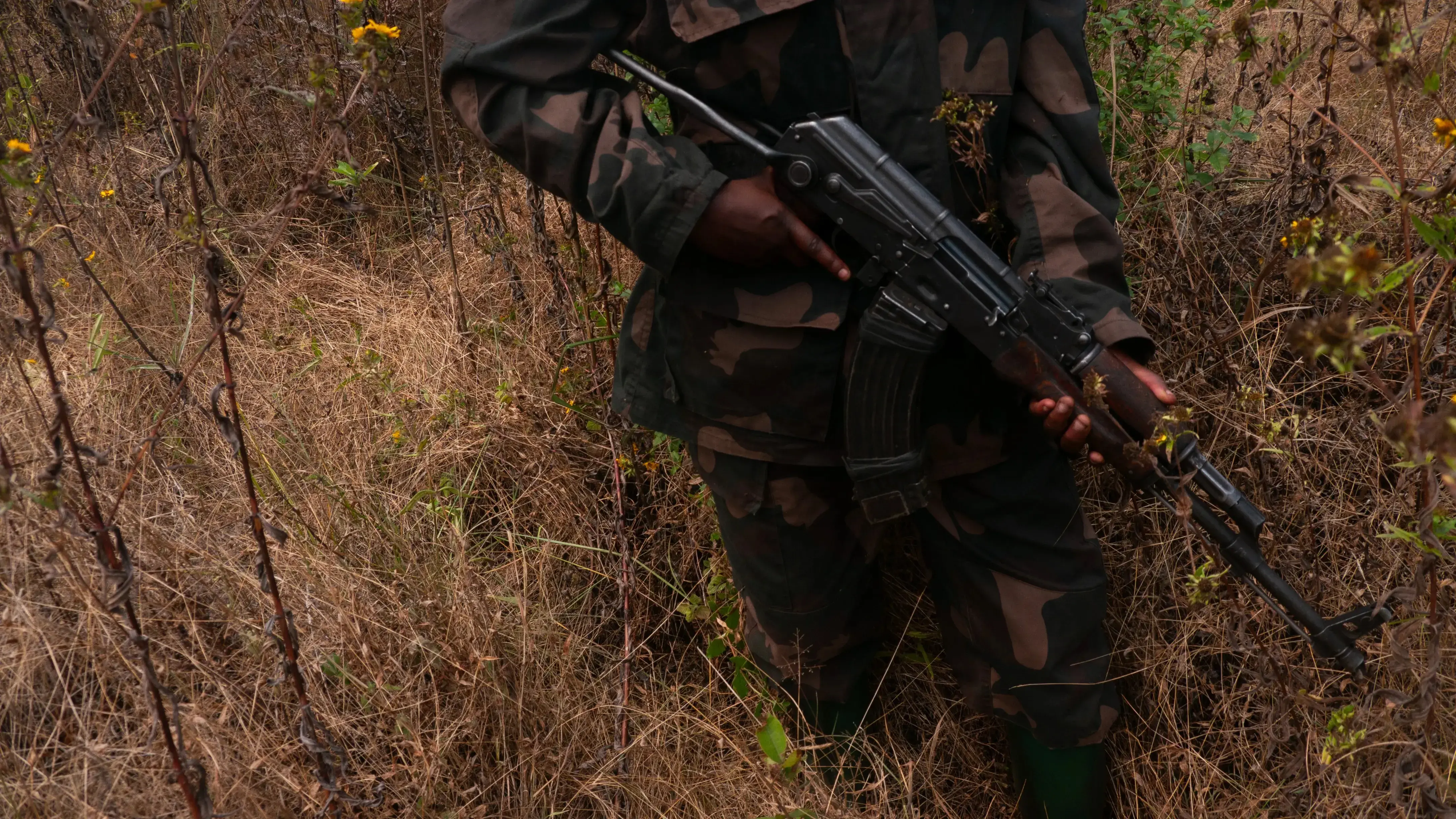
Marie Byamwungu, a 20-year-old fighter with the Union of Forces for the Patriotic Defence of Congo (UFPDC). Image by Sophie Neiman/Al Jazeera. Democratic Republic of the Congo.

ENGLISH
Project
Women and War in Eastern Congo
READ MORE ABOUT THIS PROJECT

Marie Byamwungu, a 20-year-old fighter with the Union of Forces for the Patriotic Defence of Congo (UFPDC). Image by Sophie Neiman/Al Jazeera. Democratic Republic of the Congo.
LONG READ
Local self-defence militias called the Wazalendo are taking up arms against the M23 group that’s launching attacks in DRC.
Goma, Democratic Republic of the Congo — Marie Byamwungu fiddles with the overlong sleeves of her camouflage shirt, the military uniform hanging like a costume on her slight fame.
But her lips curl back into a wry smile when the 20-year-old, whose real name we are not using for security reasons, describes fierce battles between her militia group and M23 rebels, who are in the middle of an insurgency in eastern Democratic Republic of the Congo (DRC).
“I’ve seen heavy fighting, but I am proud. I can still go to fight,” she says, sitting in a paramilitary base some three kilometres (1.9 miles) from the front lines, north of the city of Goma.
Local self-defence militias called the Wazalendo are taking up arms against the M23 group that’s launching attacks in DRC.
Goma, Democratic Republic of the Congo — Marie Byamwungu fiddles with the overlong sleeves of her camouflage shirt, the military uniform hanging like a costume on her slight fame.
But her lips curl back into a wry smile when the 20-year-old, whose real name we are not using for security reasons, describes fierce battles between her militia group and M23 rebels, who are in the middle of an insurgency in eastern Democratic Republic of the Congo (DRC).
“I’ve seen heavy fighting, but I am proud. I can still go to fight,” she says, sitting in a paramilitary base some three kilometres (1.9 miles) from the front lines, north of the city of Goma.
Behind her, a group of young men lounge in a pocket of shade, joking loudly while holding assault rifles loosely across their knees.
The fighters have taken up arms under the umbrella of the Wazalendo, or “patriots” in Kiswahili — local self-defence forces who say they are fighting to protect their communities from M23 attacks.
Originally composed of former soldiers mutinying from the Congolese army in 2012, M23 resurfaced with increased military activities in early 2022.
The M23 rebellion has led to renewed violence and displacement. Some 1.7 million people have been forced to flee their homes in eastern DRC, with many living in makeshift structures of plastic sheeting and flimsy wood, built precariously on the outskirts of cities in North Kivu province.
According to the United Nations Group of Experts and the United States Department of State, M23 is backed by Rwanda and Uganda. The UN experts have also accused some 3,000 to 4,000 Rwandan troops of fighting alongside M23, with their forces equalling those of the rebels. Both Rwanda and Uganda deny supporting the M23 rebellion.
In November 2022, Congolese President Felix Tshisekedi called on young people to join the Armed Forces of the Democratic Republic of the Congo (FARDC) in its fight against M23, or at least to take up weapons independently.
“I invite them to organise themselves into vigilance groups with a view to propping up, accompanying and supporting our armed forces,” the president said in a speech broadcast on national television.
Afterwards, the leaders of several notorious armed groups met secretly in the remote eastern town of Pinga, to sign a non-aggression pact agreeing to unite with the FARDC against M23, according to Human Rights Watch. A subsequent government decree of September 2023 legalised the presence of militias within the national army.
In an embattled region that is home to more than 100 armed groups, the Wazalendo coalition now includes newly formed rebel units and long-established fighters who have battled in each of the successive conflicts to rock DRC over the last three decades.
Members of the Wazalendo and the FARDC say they are partners in the struggle against M23. The Wazalendo often charge into battle ahead of their military counterparts, with the FARDC following behind militia battalions.
Judith Verweijen, an assistant professor at Utrecht University studying militarisation in Congo, describes the situation in blunt terms. “These armed groups have, in fact, gotten a blank check from the FARDC to do as they please,” she told Al Jazeera.
Women on the front
Women have joined the Wazalendo for different reasons; among them, to escape economic hardship, seek protection, search for influence, or simply because they feel that they have no other options than to fight.
Byamwungu is one of the female fighters taking to the battlefield alongside the majority male combatants. She and most other women in the Wazalendo have enlisted in low rank-and-file positions, so are particularly at risk of dying in combat, experts say.
Conflict uprooted Byamwungu around the same time that Tshisekedi was calling on young people to take up arms.
She still remembers the sounds of heavy bombs and mortars falling on her village, as Congolese soldiers fought with M23. She could not save any of her possessions. The only option was to run wildly south towards Goma with her family, reaching a dilapidated displaced persons camp by a roadside leading out of the city.
Its feather-white tents were built atop hardened lava rocks left over from past eruptions of the nearby volcano Mount Nyiragongo, giving the very ground of the place a hellish quality.
She never had enough food to eat. Women who ventured into the nearby forest to look for sustenance were in danger of being raped by armed groups. Children who walked into Goma to beg were hit by motorcycles and cars.
“We were starving in the camp,” Byamwungu says bitterly.
Members of the Wazalendo often strode past her tent on their way to drink at nearby bars and manned positions in the surrounding hills, just visible from the camp.
After two years, Byamwungu decided to join the Wazalendo herself. Her mother begged her to remain with the family and stay safe, but her father did not try to stop her. He was pleased, Byamwungu says.
She opted to join an outfit of fighters called the Union of Forces for the Patriotic Defence of Congo (UFPDC), swearing her allegiance to them three months ago.
Byamwungu was trained to shoot a gun, and to aim it towards opponents. Alongside other female fighters, she took responsibility for cleaning the base and cooking for the male fighters.
The plastic tents of her new home look much like the displacement camp she left behind, with temporary structures built haphazardly between low slopes and bushes. Empty bottles of gin litter the ground.
Byamwungu has not seen her parents since joining the Wazalendo. She misses them often, but her mother and father have since gone back to their village. When Byamwungu returned to the old camp looking for her family, she only found her brother, and hinted to him that she wanted to come home.
“My brother said, there is nothing to change. You cannot leave. Be patient and be courageous,” Byamwungu remembers. She listened and quickly went back to the rebel base.
“We have so many young people,” says General Mbokani Kimanuka, who founded the UFPDC during the first M23 war in 2012. “They are leaving their homes and businesses to join the fighting. They have all become patriots.”
Members of the Wazalendo say they are sustained by the kindness of nearby communities. “Local people tell us to be strong,” the General says. “They provide some food, plastic sheets and plastic boots.”
It is their familial connection to eastern DRC that keeps UFPDC fighters safe, Kimanuka claims. “We are native. We are born here. We have protection from our grandfathers.” Before each battle, Kimanuka and his troops pray to God and the ancestors.
Kimanuka’s UFPDC is not the only armed group to embrace female recruits.
When Tshisekedi called on young people to take up arms and defend the country, Vivienne Ntumba — also using a pseudonym for her protection — was eager to join the military.
Her mother forbade it, worrying that army operations would take Ntumba too far away from home. The young woman protested. At last, mother and daughter agreed that she would instead join one of the Wazalendo groups fighting against M23.
Ntumba selected the Alliance of Patriots for a Free and Sovereign Congo (APCLS).
Established in 2006 by General Janvier Karairi, it was one of the militias to sign the non-aggression pact in Pinga in 2022. Since last year, Karairi has been subject to sanctions from the European Union over his involvement in armed violence in the country.
The APCLS wing, which Ntumba joined, occupies territory in Nyiragongo, not far from the front lines north of Goma.
Only 24 years old, Ntumba oversees a dozen other female fighters. She deploys the women to the places where fighting is fierce, and runs ammunition between male gunners.
“I feel proud because we are all on the front line,” she says, sweeping long red braids from her eyes. She also reminds fighters not to loot or steal.
Al Jazeera met Ntumba on the roof of a bar on the outskirts of Goma. As she told her story, other fighters drank deeply from bottles of beer and smoked cigarettes, green glass shining on the ground.
Young, exuberant and unpredictable, the Wazalendo casually stroll past displacement camps in uniform and carouse at local bars, feasting on greasy goat brochette and strong beer.
During an April visit to eastern DRC, United Nations High Commissioner for Human Rights Volker Turk accused members of the Wazalendo of committing human rights abuses. A report from the UN Group of Experts specifically charged the Nyiragongo contingent of APCLS, with which Ntumba fights, of violations including executions, kidnappings for ransom and arbitrary detentions.
The fighters have taken up arms under the umbrella of the Wazalendo, or “patriots” in Kiswahili — local self-defence forces who say they are fighting to protect their communities from M23 attacks.
Originally composed of former soldiers mutinying from the Congolese army in 2012, M23 resurfaced with increased military activities in early 2022.
The M23 rebellion has led to renewed violence and displacement. Some 1.7 million people have been forced to flee their homes in eastern DRC, with many living in makeshift structures of plastic sheeting and flimsy wood, built precariously on the outskirts of cities in North Kivu province.
According to the United Nations Group of Experts and the United States Department of State, M23 is backed by Rwanda and Uganda. The UN experts have also accused some 3,000 to 4,000 Rwandan troops of fighting alongside M23, with their forces equalling those of the rebels. Both Rwanda and Uganda deny supporting the M23 rebellion.
In November 2022, Congolese President Felix Tshisekedi called on young people to join the Armed Forces of the Democratic Republic of the Congo (FARDC) in its fight against M23, or at least to take up weapons independently.
“I invite them to organise themselves into vigilance groups with a view to propping up, accompanying and supporting our armed forces,” the president said in a speech broadcast on national television.
Afterwards, the leaders of several notorious armed groups met secretly in the remote eastern town of Pinga, to sign a non-aggression pact agreeing to unite with the FARDC against M23, according to Human Rights Watch. A subsequent government decree of September 2023 legalised the presence of militias within the national army.
In an embattled region that is home to more than 100 armed groups, the Wazalendo coalition now includes newly formed rebel units and long-established fighters who have battled in each of the successive conflicts to rock DRC over the last three decades.
Members of the Wazalendo and the FARDC say they are partners in the struggle against M23. The Wazalendo often charge into battle ahead of their military counterparts, with the FARDC following behind militia battalions.
Judith Verweijen, an assistant professor at Utrecht University studying militarisation in Congo, describes the situation in blunt terms. “These armed groups have, in fact, gotten a blank check from the FARDC to do as they please,” she told Al Jazeera.
Women on the front
Women have joined the Wazalendo for different reasons; among them, to escape economic hardship, seek protection, search for influence, or simply because they feel that they have no other options than to fight.
Byamwungu is one of the female fighters taking to the battlefield alongside the majority male combatants. She and most other women in the Wazalendo have enlisted in low rank-and-file positions, so are particularly at risk of dying in combat, experts say.
Conflict uprooted Byamwungu around the same time that Tshisekedi was calling on young people to take up arms.
She still remembers the sounds of heavy bombs and mortars falling on her village, as Congolese soldiers fought with M23. She could not save any of her possessions. The only option was to run wildly south towards Goma with her family, reaching a dilapidated displaced persons camp by a roadside leading out of the city.
Its feather-white tents were built atop hardened lava rocks left over from past eruptions of the nearby volcano Mount Nyiragongo, giving the very ground of the place a hellish quality.
She never had enough food to eat. Women who ventured into the nearby forest to look for sustenance were in danger of being raped by armed groups. Children who walked into Goma to beg were hit by motorcycles and cars.
“We were starving in the camp,” Byamwungu says bitterly.
Members of the Wazalendo often strode past her tent on their way to drink at nearby bars and manned positions in the surrounding hills, just visible from the camp.
After two years, Byamwungu decided to join the Wazalendo herself. Her mother begged her to remain with the family and stay safe, but her father did not try to stop her. He was pleased, Byamwungu says.
She opted to join an outfit of fighters called the Union of Forces for the Patriotic Defence of Congo (UFPDC), swearing her allegiance to them three months ago.
Byamwungu was trained to shoot a gun, and to aim it towards opponents. Alongside other female fighters, she took responsibility for cleaning the base and cooking for the male fighters.
The plastic tents of her new home look much like the displacement camp she left behind, with temporary structures built haphazardly between low slopes and bushes. Empty bottles of gin litter the ground.
Byamwungu has not seen her parents since joining the Wazalendo. She misses them often, but her mother and father have since gone back to their village. When Byamwungu returned to the old camp looking for her family, she only found her brother, and hinted to him that she wanted to come home.
“My brother said, there is nothing to change. You cannot leave. Be patient and be courageous,” Byamwungu remembers. She listened and quickly went back to the rebel base.
“We have so many young people,” says General Mbokani Kimanuka, who founded the UFPDC during the first M23 war in 2012. “They are leaving their homes and businesses to join the fighting. They have all become patriots.”
Members of the Wazalendo say they are sustained by the kindness of nearby communities. “Local people tell us to be strong,” the General says. “They provide some food, plastic sheets and plastic boots.”
It is their familial connection to eastern DRC that keeps UFPDC fighters safe, Kimanuka claims. “We are native. We are born here. We have protection from our grandfathers.” Before each battle, Kimanuka and his troops pray to God and the ancestors.
Kimanuka’s UFPDC is not the only armed group to embrace female recruits.
When Tshisekedi called on young people to take up arms and defend the country, Vivienne Ntumba — also using a pseudonym for her protection — was eager to join the military.
Her mother forbade it, worrying that army operations would take Ntumba too far away from home. The young woman protested. At last, mother and daughter agreed that she would instead join one of the Wazalendo groups fighting against M23.
Ntumba selected the Alliance of Patriots for a Free and Sovereign Congo (APCLS).
Established in 2006 by General Janvier Karairi, it was one of the militias to sign the non-aggression pact in Pinga in 2022. Since last year, Karairi has been subject to sanctions from the European Union over his involvement in armed violence in the country.
The APCLS wing, which Ntumba joined, occupies territory in Nyiragongo, not far from the front lines north of Goma.
Only 24 years old, Ntumba oversees a dozen other female fighters. She deploys the women to the places where fighting is fierce, and runs ammunition between male gunners.
“I feel proud because we are all on the front line,” she says, sweeping long red braids from her eyes. She also reminds fighters not to loot or steal.
Al Jazeera met Ntumba on the roof of a bar on the outskirts of Goma. As she told her story, other fighters drank deeply from bottles of beer and smoked cigarettes, green glass shining on the ground.
Young, exuberant and unpredictable, the Wazalendo casually stroll past displacement camps in uniform and carouse at local bars, feasting on greasy goat brochette and strong beer.
During an April visit to eastern DRC, United Nations High Commissioner for Human Rights Volker Turk accused members of the Wazalendo of committing human rights abuses. A report from the UN Group of Experts specifically charged the Nyiragongo contingent of APCLS, with which Ntumba fights, of violations including executions, kidnappings for ransom and arbitrary detentions.
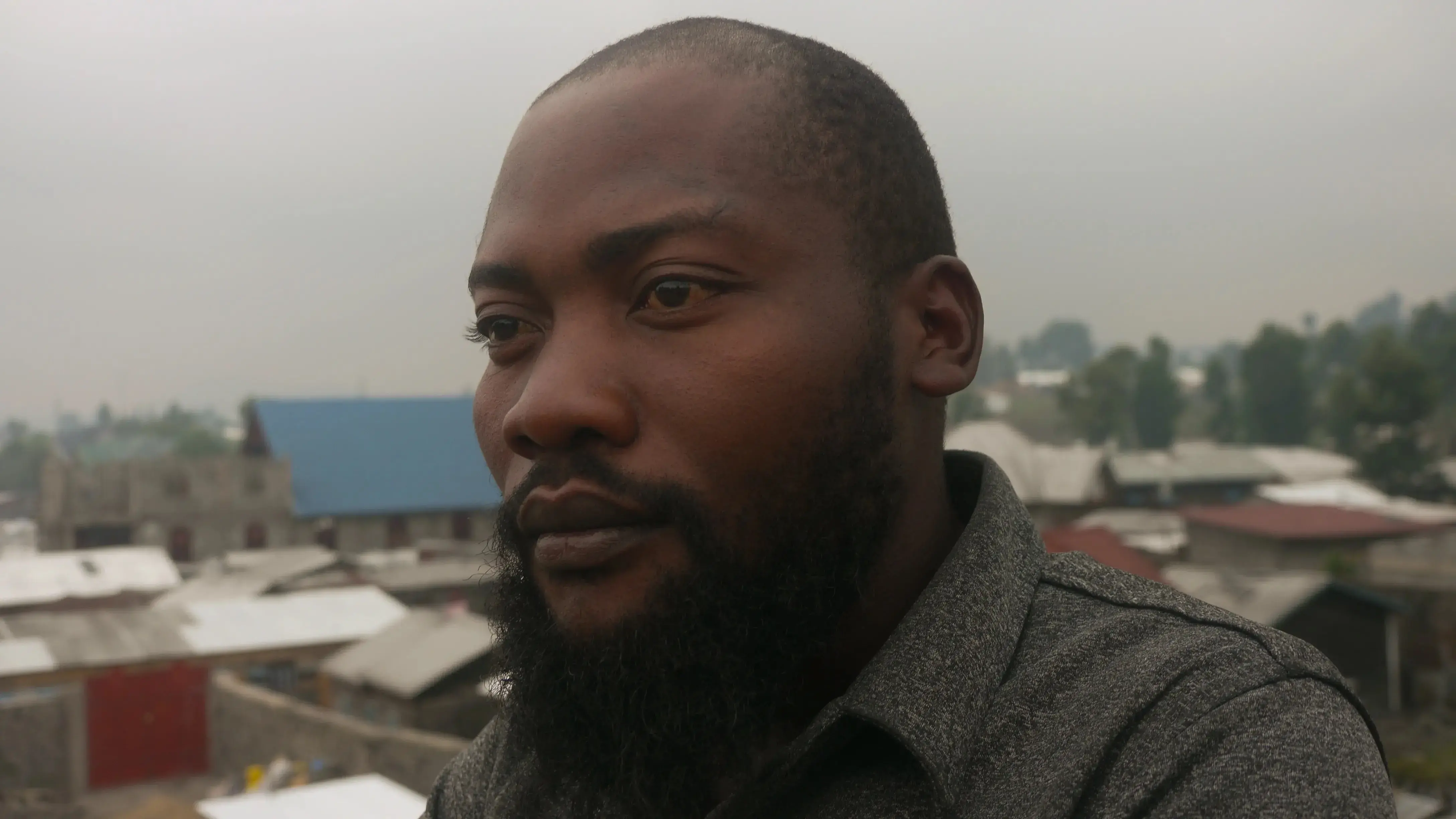
General Nibunda Kakuru commands a brigade of the Nyiragongo contingent of the APCLS. Image by Sophie Neiman/Al Jazeera. Democratic Republic of the Congo.
Al Jazeera repeated these allegations to General Nibunda Kakuru, who commands a brigade of the Nyiragongo wing of APCLS. “It is lies. Lies,” he said calmly. “This is new information to me. I don’t know if there is any case of it.”
The general has been at war for almost half his life, working his way through the ranks of armed groups since he was 16 years old.
Kakuru told Al Jazeera that the Congolese military was providing food and unspecified “military equipment” to APCLS, and that the army and the Wazalendo share ammunition on the battlefield. “We are working together because we are all Congolese,” he said.
Al Jazeera held an interview with Lieutenant-Colonel Guillaume Njike Kaiko, who serves as the spokesperson for the military governor of North Kivu. The embattled province has been under a state of siege and military governance since 2021. Kaiko affirmed the collaboration between the Wazalendo and the government.
“They are partners like any other partner,” he said, alluding to the collaboration between the Congolese government, UN peacekeepers and soldiers from the Southern African Development Community (SADC) deployed to eastern DRC. “We have the same objective, which is to push the Rwandan army outside our territorial limits.”
Al Jazeera asked Kaiko twice to respond — yes or no — as to whether or not the Congolese government was providing arms to the Wazalendo.
He did not answer directly. “The former armed groups, before the war [against M23] had weapons. Where did they get those weapons?” Kaiko replied.
When asked if the government had concerns about its collaborators in the Wazalendo, particularly given reports of human rights abuses by the armed groups, Kaiko was brusque. “The Wazalendo are not a trained military. They’ve not been trained in international human rights,” he said. This is why the Wazalendo are the vanguard of each battle, with the FARDC following behind to observe them, Kaiko explained.
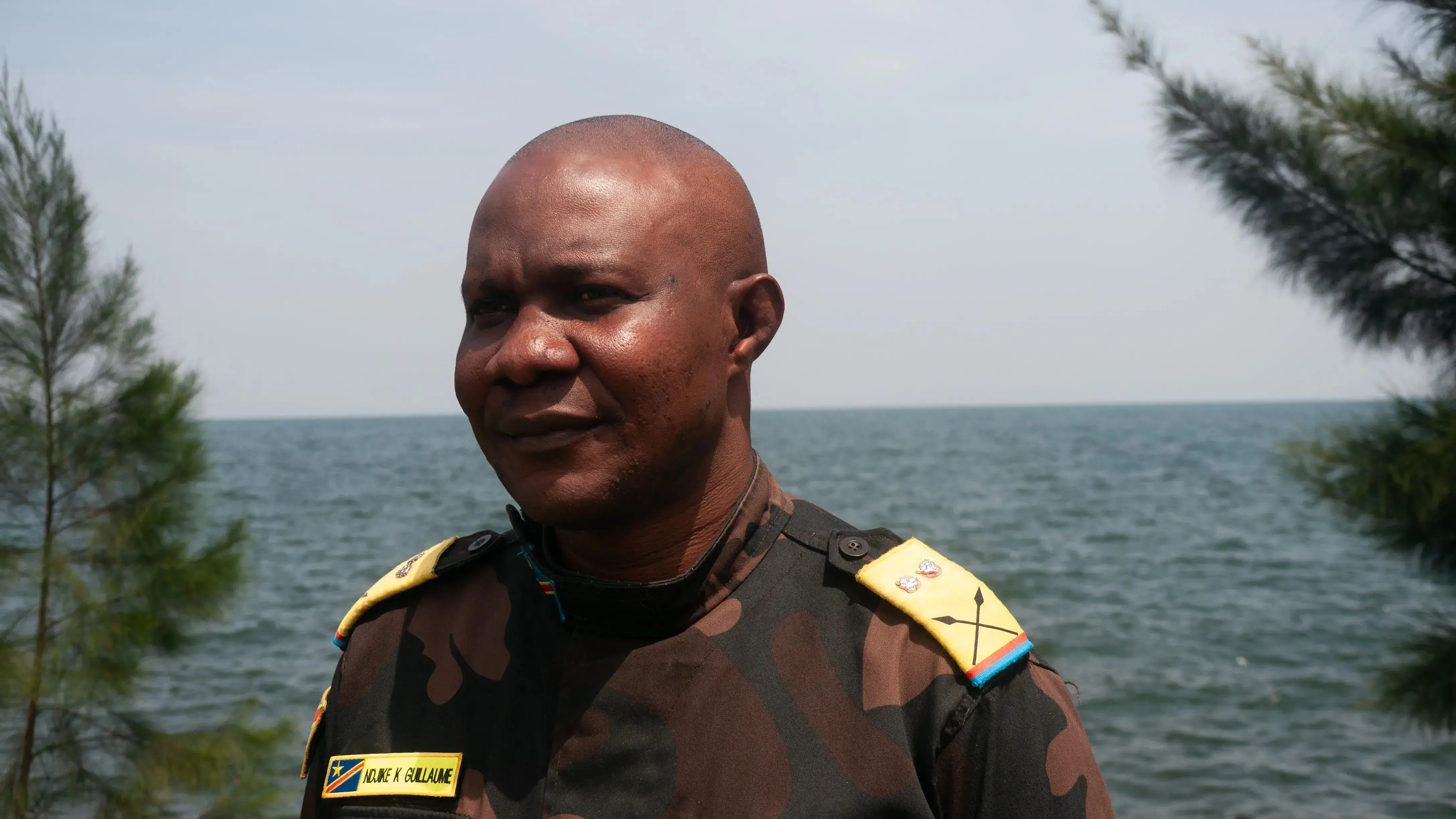
Lieutenant-Colonel Guillaume Njike Kaiko, the spokesperson for the military governor of North Kivu. Image by Sophie Neiman/Al Jazeera. Democratic Republic of Congo.
“These groups are being given arms and ammunition and logistical support by the Congolese government,” said Verweijen, the academic. “That makes the Congolese government responsible for any types of abuses which these groups are committing against the civilian population.”
Broken families
Families of eager fighters who have joined the Wazalendo live each day with the quieter pain of wondering when and if they will see their children again.
Every time Ntumba returns to her mother, the woman says a prayer of thanks that her daughter is still alive. She is lucky to be able to spend time with her child at all.
Zawadi Tumsifi — who spoke to Al Jazeera on condition that her name be changed — says her daughter joined a Wazalendo group known as the Coalition of Movements for Change (CMC) last year.
As Tumsifi fled her home in the M23-occupied Bunagana town with her six children one early morning two years ago, her husband was killed by a bomb. “He was very kind,” she recalls quietly.
The family made it further south into Rutshuru territory, where they stayed for six months before war sent them running again, this time to a crowded displacement camp on the edge of Goma.
It was hard to get enough food to eat, says Tumsifi, who had once made a living illegally smuggling beer and sugar over the Ugandan border. While speaking she began to cry, as she does whenever she thinks of her lost husband and the life she left behind, quickly wiping her eyes on the corner of her wrap skirt.
In December 2023, Tumsifi ventured into the forest surrounding her displacement camp to search for firewood. She was raped.
Stories like Tumsifi’s are common. A survey by Doctors Without Borders, known by its French initials, MSF, found that one in 10 women living in displacement camps around Goma had been raped between January and April of 2024. MSF told Al Jazeera it had treated an additional 620 cases of sexual violence in the month of May alone, at three of the clinics where it operates.
After her rape, a doctor revealed to Tumsifi that she had been infected with HIV/AIDS.
Tumsifi shared the diagnosis with her 19-year-old daughter, who furiously announced that she would join the Wazalendo. In an exhausted voice, Tumsifi recounted the conversation to Al Jazeera. “She told me, I have no father … now, you are sick. I have no other choice,” she repeated
.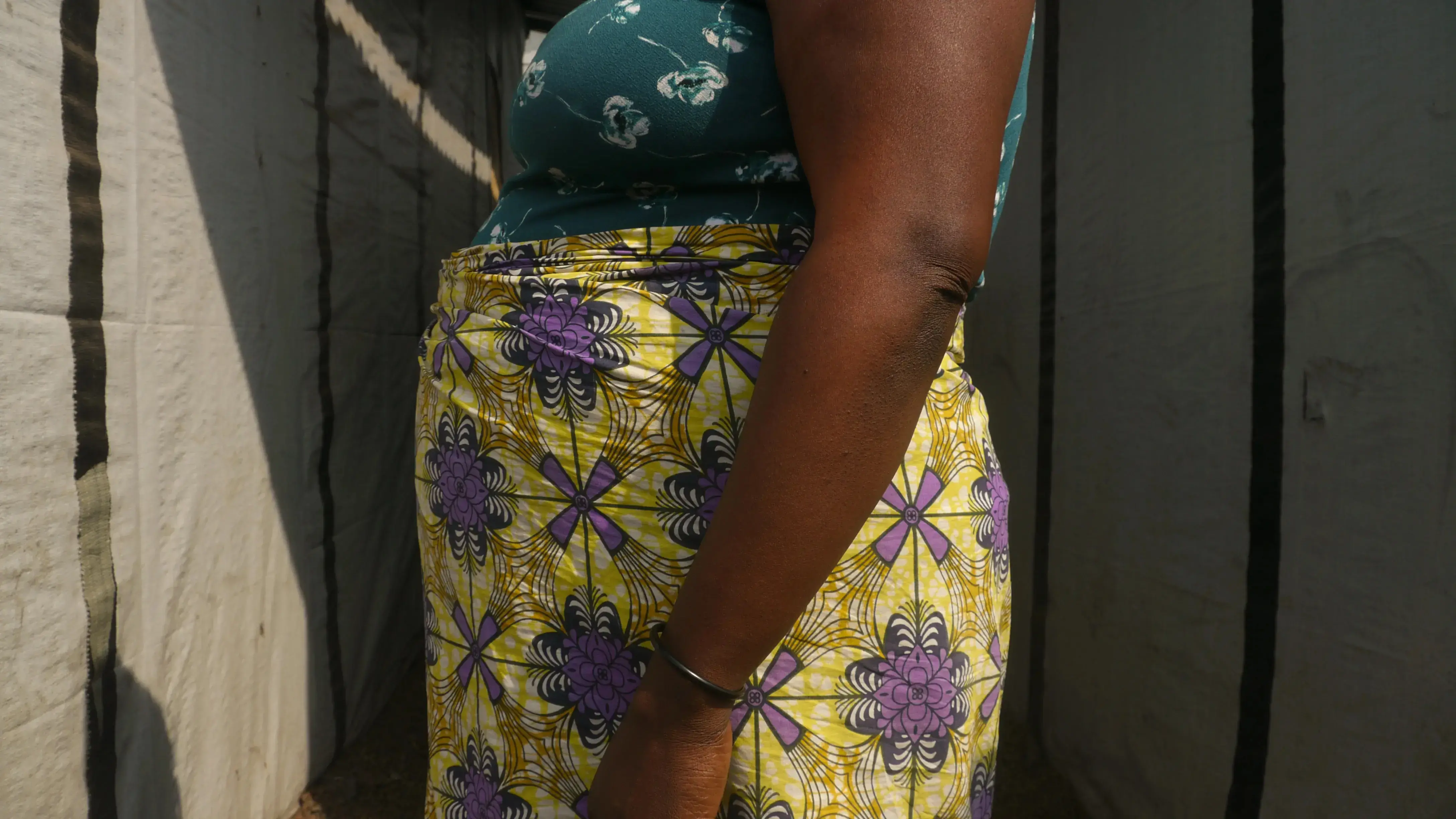
Zawadi Tumsifi’s daughter joined a Wazalendo group known as the Coalition of Movements for Change last year. Image by Sophie Neiman/Al Jazeera. Democratic Republic of the Congo.
The young woman still visits the camp to collect water for her fellow fighters in CMC, and brings some for her mother when she does. On one of these occasions, she confessed that she was tired of fighting and wanted to leave. Tumsifi tried to negotiate with a CMC commander, asking him to please allow her daughter to return. But he demanded $300 in exchange, a sum she does not have.
“I hope she survives. I hope she comes back here to look after me,” Tumsifi says.
Women who remain with the fighters have limited future options. Even if the war with M23 ends, Byamwungu hopes to remain with the UFPDC. “I am used to being with the Wazalendo,” she says casually. “We have become like one family.”
Ntumba also struggles to imagine a life for herself away from battles and gunfire. “When this war is over, I’d prefer to stay in the army,” she says. “Maybe if peace is recovered, I can think of having a husband and children.”
The Congolese government has indicated that it hopes to integrate Wazalendo fighters into a reserve brigade of the national army.
For Verweijen, it is a move reminiscent of past cycles of conflict in DRC, when armed groups were brought into the army and promptly rebelled because they were dissatisfied with their postings.
“We’ve seen a very similar dynamic at the end of the Second Congo War when an agreement was signed between all former belligerent forces to integrate their troops into the FARDC,” she said, referring to a bloody conflict that took place between 1998 and 2001.
“Army integration basically created incentives for returning to the bush, creating more mayhem, and then trying, in another round of integration, to cash in on that mayhem and to obtain more important ranks and positions,” Verweijen added.
But when asked what they hope for the future of DRC, the women rebels give a simple answer: Peace, they say, clutching tightly to their guns.

As a nonprofit journalism organization, we depend on your support to fund more than 170 reporting projects every year on critical global and local issues. Donate any amount today to become a Pulitzer Center Champion and receive exclusive benefits!

Zawadi Tumsifi’s daughter joined a Wazalendo group known as the Coalition of Movements for Change last year. Image by Sophie Neiman/Al Jazeera. Democratic Republic of the Congo.
The young woman still visits the camp to collect water for her fellow fighters in CMC, and brings some for her mother when she does. On one of these occasions, she confessed that she was tired of fighting and wanted to leave. Tumsifi tried to negotiate with a CMC commander, asking him to please allow her daughter to return. But he demanded $300 in exchange, a sum she does not have.
“I hope she survives. I hope she comes back here to look after me,” Tumsifi says.
Women who remain with the fighters have limited future options. Even if the war with M23 ends, Byamwungu hopes to remain with the UFPDC. “I am used to being with the Wazalendo,” she says casually. “We have become like one family.”
Ntumba also struggles to imagine a life for herself away from battles and gunfire. “When this war is over, I’d prefer to stay in the army,” she says. “Maybe if peace is recovered, I can think of having a husband and children.”
The Congolese government has indicated that it hopes to integrate Wazalendo fighters into a reserve brigade of the national army.
For Verweijen, it is a move reminiscent of past cycles of conflict in DRC, when armed groups were brought into the army and promptly rebelled because they were dissatisfied with their postings.
“We’ve seen a very similar dynamic at the end of the Second Congo War when an agreement was signed between all former belligerent forces to integrate their troops into the FARDC,” she said, referring to a bloody conflict that took place between 1998 and 2001.
“Army integration basically created incentives for returning to the bush, creating more mayhem, and then trying, in another round of integration, to cash in on that mayhem and to obtain more important ranks and positions,” Verweijen added.
But when asked what they hope for the future of DRC, the women rebels give a simple answer: Peace, they say, clutching tightly to their guns.

As a nonprofit journalism organization, we depend on your support to fund more than 170 reporting projects every year on critical global and local issues. Donate any amount today to become a Pulitzer Center Champion and receive exclusive benefits!
